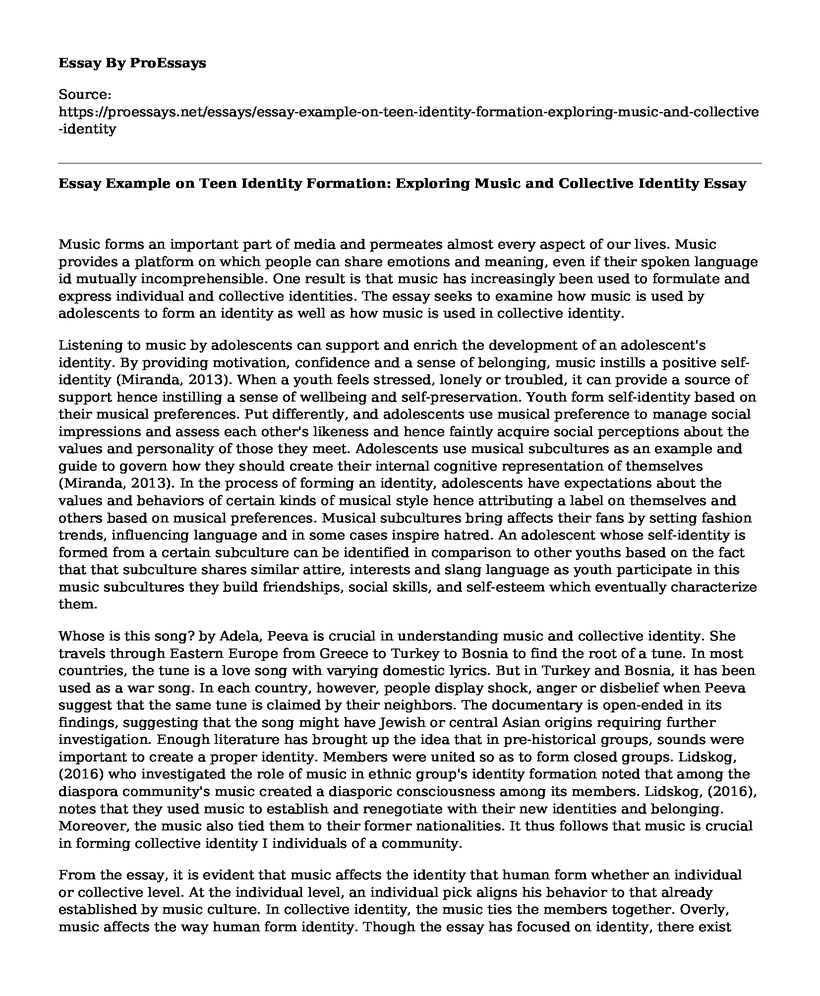Music forms an important part of media and permeates almost every aspect of our lives. Music provides a platform on which people can share emotions and meaning, even if their spoken language id mutually incomprehensible. One result is that music has increasingly been used to formulate and express individual and collective identities. The essay seeks to examine how music is used by adolescents to form an identity as well as how music is used in collective identity.
Listening to music by adolescents can support and enrich the development of an adolescent's identity. By providing motivation, confidence and a sense of belonging, music instills a positive self-identity (Miranda, 2013). When a youth feels stressed, lonely or troubled, it can provide a source of support hence instilling a sense of wellbeing and self-preservation. Youth form self-identity based on their musical preferences. Put differently, and adolescents use musical preference to manage social impressions and assess each other's likeness and hence faintly acquire social perceptions about the values and personality of those they meet. Adolescents use musical subcultures as an example and guide to govern how they should create their internal cognitive representation of themselves (Miranda, 2013). In the process of forming an identity, adolescents have expectations about the values and behaviors of certain kinds of musical style hence attributing a label on themselves and others based on musical preferences. Musical subcultures bring affects their fans by setting fashion trends, influencing language and in some cases inspire hatred. An adolescent whose self-identity is formed from a certain subculture can be identified in comparison to other youths based on the fact that that subculture shares similar attire, interests and slang language as youth participate in this music subcultures they build friendships, social skills, and self-esteem which eventually characterize them.
Whose is this song? by Adela, Peeva is crucial in understanding music and collective identity. She travels through Eastern Europe from Greece to Turkey to Bosnia to find the root of a tune. In most countries, the tune is a love song with varying domestic lyrics. But in Turkey and Bosnia, it has been used as a war song. In each country, however, people display shock, anger or disbelief when Peeva suggest that the same tune is claimed by their neighbors. The documentary is open-ended in its findings, suggesting that the song might have Jewish or central Asian origins requiring further investigation. Enough literature has brought up the idea that in pre-historical groups, sounds were important to create a proper identity. Members were united so as to form closed groups. Lidskog, (2016) who investigated the role of music in ethnic group's identity formation noted that among the diaspora community's music created a diasporic consciousness among its members. Lidskog, (2016), notes that they used music to establish and renegotiate with their new identities and belonging. Moreover, the music also tied them to their former nationalities. It thus follows that music is crucial in forming collective identity I individuals of a community.
From the essay, it is evident that music affects the identity that human form whether an individual or collective level. At the individual level, an individual pick aligns his behavior to that already established by music culture. In collective identity, the music ties the members together. Overly, music affects the way human form identity. Though the essay has focused on identity, there exist other effects that music has on the individuals.
References
Lidskog, R. (2016). The role of music in ethnic identity formation in diaspora: a research review. International Social Science Journal, 66(219-220), 23-38. doi:10.1111/issj.12091
Miranda, D. (2013). The role of music in adolescent development: much more than the same old song. International Journal of Adolescence and Youth, 18(1), 5-22. doi:10.1080/02673843.2011.650182
Peeva, A. (2003). Whose Is This Song? [Video file]. Retrieved from https://www.imdb.com/title/tt0387926/
Cite this page
Essay Example on Teen Identity Formation: Exploring Music and Collective Identity. (2022, Dec 29). Retrieved from https://proessays.net/essays/essay-example-on-teen-identity-formation-exploring-music-and-collective-identity
If you are the original author of this essay and no longer wish to have it published on the ProEssays website, please click below to request its removal:
- How Does Social Media and Other Technology Influence How We Form Our Identity?
- Paper Example on Ladder of Abstraction
- Mortality Attributable to Low Levels of Education in the United States Paper Example
- Citation Activity on The Rich Get Richer, and the Poor Get Robbed: Inequality in U.S. Criminal Victimization
- The Short-Term and Long-Term Effects of Divorce on Children Essay
- Essay Sample on Majority Shareholders Dominating Minority: Legal Complications
- Underage Drinking: Parents Partly to Blame - Essay Sample







